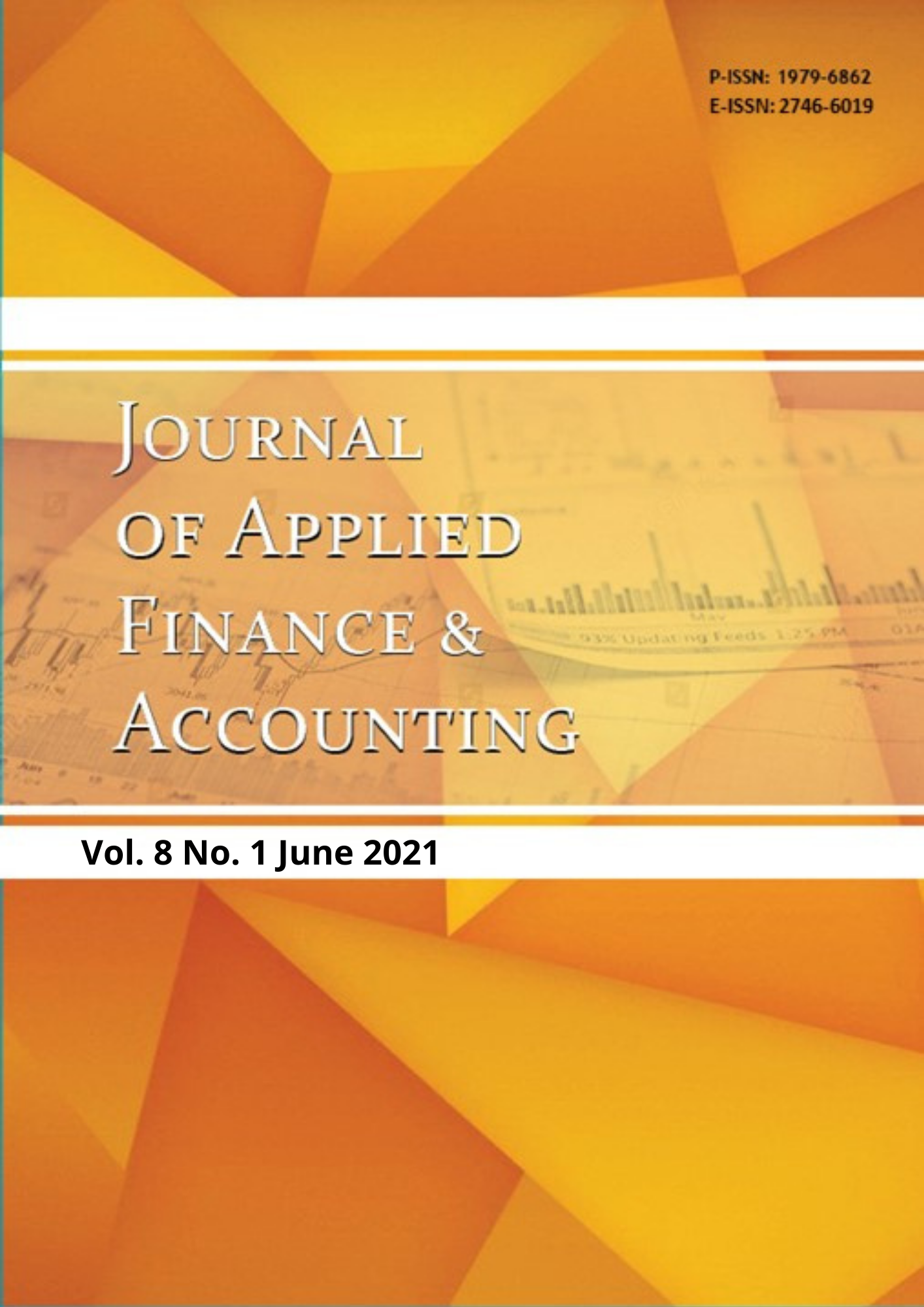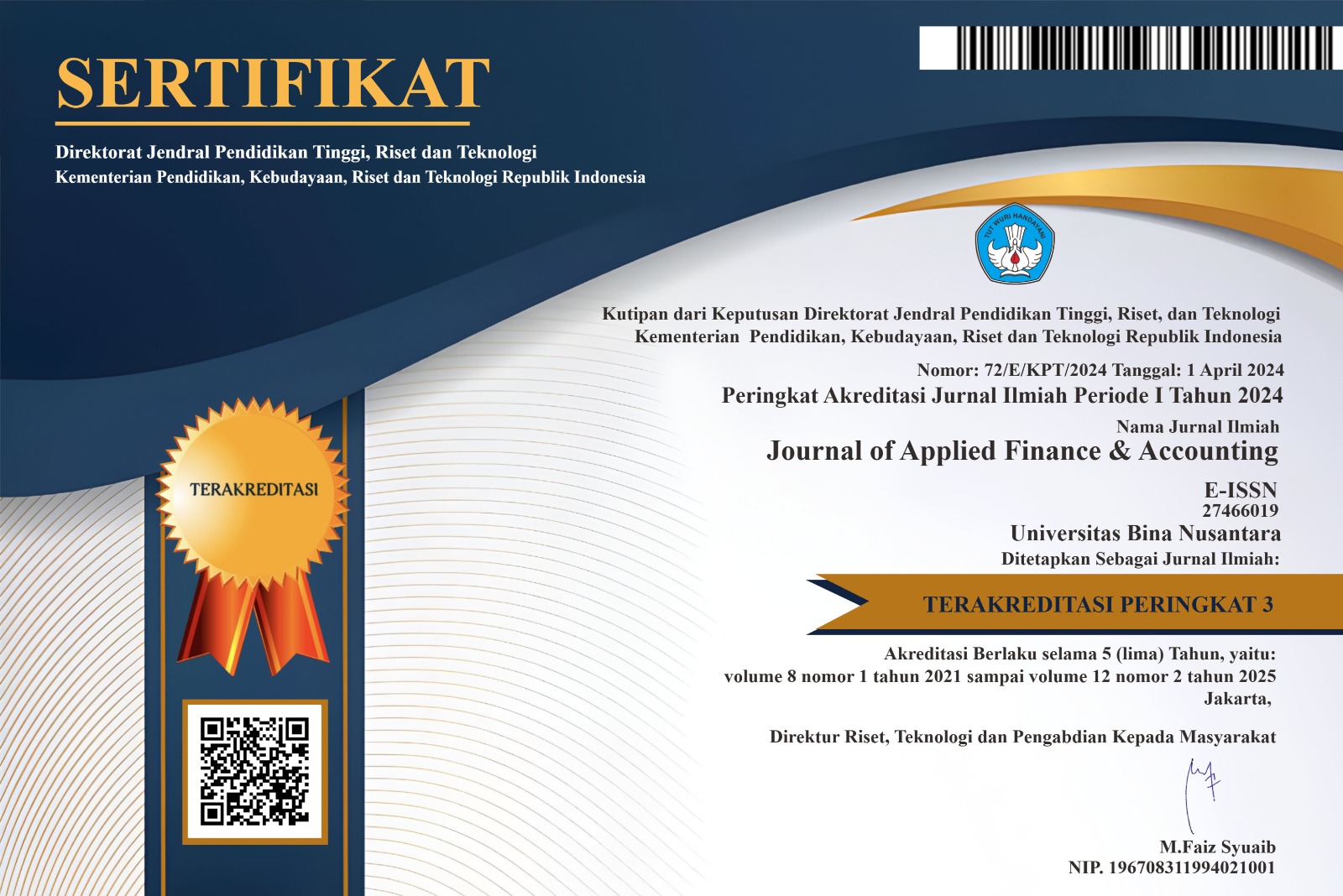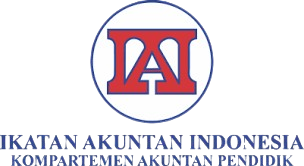FACTORS AFFECTING FRAUD PREVENTION AND ITS IMPLICATION TO THE QUALITY OF FINANCIAL STATEMENTS
DOI:
https://doi.org/10.21512/jafa.v8i1.6858Keywords:
Internal Control, Internal Audit, Risk-Based Audit, Audit Committee, Whistleblowing System, Fraud Prevention, Quality of Financial StatementAbstract
The study aims to determine the effect of internal control, internal audit, risk-based audit, audit committee, and whistleblowing system on fraud prevention and its implications to the quality of financial statements. The sample consisted of 7 companies from 12 populations of chemical sub-sector companies and 5 companies from 10 populations of pharmaceutical sub-sector companies listed on the Indonesia Stock Exchange in 2018. Data were collected using questionnaires with 154 respondents. The analysis technique using Structural Equation Modeling (SEM) and processed with Lisrel 8.8. The results indicate that, partially, internal control, internal audit, risk-based audit, and audit committee have a positive and significant effect on fraud prevention, while the whistleblowing system partially has a negative and insignificant effect. However, simultaneously, the direct effect of internal control, internal audit, risk-based audit, audit committee, and whistleblowing system on fraud prevention have a positive and significant effect. The results also show partially internal control, internal audit, whistleblowing system, and fraud prevention have a positive and significant effect on the quality of financial statements while risk-based audit has a positive but not significant effect and the audit committee has a negative and insignificant effect on the quality of financial statements. However, simultaneously, the indirect effect of internal control, internal audit, risk-based audit, audit committee, whistleblowing system on the quality of financial statements through fraud prevention have a positive and significant effect.
References
Albrecht, W. S., Albrecht, C. O., Albrecht C. C., & Zimbelman, M. F. (2012). Fraud Examination, 4th Ed. Mason, Ohio: South Western Cengage Learning.
Arens, A. A., Elder, R. J., Beasley, M. S. (2010). Auditing and Assurance Services: An Integrated Approach, 13th Edition. New Jersey: Pearson Prentice Hall.
Cahyo, M. N., & Sulhani. (2017). Analisis Empiris Pengaruh Karakteristik Komite Audit, Karakteristik internal Audit, Whistleblowing System, Pengungkapan Kecurangan Terhadap Reaksi Pasar. Jurnal Dinamika Akuntansi dan Bisnis, 4(2), 249-270. doi: 10.24815/JDAB.V4I2.7704
Caturini, R & Hidayat, A. (2018, 07 Feb). Kontan: Tumbuh 5,14% di 2017 Industri Masih Jadi Kontributor Terbesar PDB Nasional. Retrieved July 05th 2018 from https://industri.kontan.co.id/news/tumbuh-514-di-2017-industri-masih-jadi-kontributor-terbesar-pdb-nasional
Coetzee, H & Lubbe, D. (2014). Improving The Efficiency and Effectiveness of Risk-Based Internal Audit Engagements. International Journal of Auditing, 18(2), 115-125.
Committee of Sponsoring Organizations of the Treadway Commission (COSO). (2013). Internal Control – Integrated Framework: Executive Summary. Durham, N.C.: American Institute of Certified Public Accountants.
Dabbagoglu, K. (2012). Fraud in Business and Internal Control System. Journal of Modern Accounting and Auditing, 8(7), 983-989.
Dyck, A., Morse, A., Zingales, L. (2010). Who blows the whistle on corporate fraud? The Journal of Finance, 65(6), 2213-2253. doi: 10.1111/j.1540-6261.2010.01614.x
Febriandi, F. (2017). Analisis Kualitatif Penerapan Audit Berbasis Risiko Dalam Pembuatan Perencanaan Audit Pada Perwakilan BPKP Provinsi Lampung. Thesis. Universitas Lampung.
Fitzsimmons, J. A., & Fitzsimmons, M. J. (2017). Service Management: Operations, Startegy, Infromation Technology 7th Ed. New York: McGraw Hill Education.
Gusnardi. (2011). Pengaruh Peran Komite Audit, Pengendalian Internal, Audit Internal dan Pelaksanaan Tata Kelola Perusahaan Terhadap Pencegahan Kecurangan. Jurnal Ekonomi dan Keuangan, EKUITAS, 15(1), 130-146. doi:10.24034/j25485024.y2011.v15.i1.196
Hair Jr., J. F., Black, W. C., Babin, B. J., Anderson, R. E. (2009). Multivariate Data Analysis (7th Edition). New Jersey: Pearson Prentice Hall.
Hassink, H. F. D., Bollen, L. H., Meuwissen, R. H. G., & Vries, M. J. (2009). Corporate Fraud and The Audit Expectations Gap: A Study Among Business Managers. Journal of International Accounting, Auditing and Taxation, Elsevier, 18(2), 85-100. doi: 10.1016/j.intaccaudtax.2009.05.003
Ikatan Komite Audit Indonesia (IKAI), Tentang Komite Audit. Retrieved Juli 20th 2018 from https://www.ikai.id/tentang-komite-audit/
Lee, G., & Xiao, X. (2018). Whistleblowing on Accounting-Related Misconduct: A Synthesis of the Literature. Journal of Accounting Literature, Elsevier, 41, 22-46. doi: 10.1016/j.acclit.2018.03.003
Lou, Y.-I., & Wang, M.-L. (2009). Fraud Risk Factor Of The Fraud Triangle Assessing The Likelihood Of Fraudulent Financial Reporting. Journal of Business & Economics Research (JBER), 7(2). doi: 10.19030/jber.v7i2.2262
Kusnadi, Y., Leong, K. S., Suwardy, T., & Wang, J. (2015). Audit Committees and Financial Reporting Quality in Singapore. Available at SSRN 2467456
Maliawan, I. B. D., Sujana, E., Diatmika, I. P. G. (2017). Pengaruh Audit Internal dan Efektivitas Pengendalian Interen Terhadap Pencegahan Kecurangan (Fraud). E-Journal S1 Ak Universitas Pendidikan Ganesha, 8(2). doi: 10.23887/jimat.v8i2.13355
Mwangi, K. A., Oluoch, J. O., Muturi, W., & Florence, M. (2017). Effect of Audit Committee Diversity on Quality of Financial Reporting in Non-Commercial State Corporations in Kenya. International Journal of Academic Research in Business and Social Sciences, 7(6), 288-302.
Nayoan. S., & Masruchin. (2017). Pengaruh Kesiapan Auditor dan Manajemen Risiko Terhadap Tata Kelola Perusahaan Dengan Variabel Mediator Risk Based Audit. Jurnal Bisnis dan Komunikasi, KALBIS SOCIO, 4(2), 144-148.
Nugrahani, T. S. (2015). Pengaruh Dewan Komisaris dan Komite Audit Pada Kualitas Laporan Keuangan. Jurnal Akuntansi dan Manajemen AKMENIKA, 14(1).
Okpala, K. E. (2012). Audit Committee and Integrity of Financial Statements: A Preventive Mechanism for Corporate Failure. Australian Journal of Business and Management Research, 2(8), 32-40.
Petrascu, D., & Tieanu, A. (2014). The Role of Internal Audit in Fraud Prevention and Detection. Procedia Economics and Finance, Elsevier, 16, 489-497. doi: 10.1016/S2212-5671(14)00829-6
Pramudityo, B. (2017). Pengaruh Kompetensi Sumber Daya Manusia, Pemanfaatan Sistem Informasi Akuntansi Keuangan Daerah, Sistem Pengendalian Intern dan Peran Internal Audit Terhadap Kualitas Laporan Keuangan Pemerintah Daerah (Thesis). Available from Electronic Theses and Dissertations Universitas Muhammadiyah Surakarta. (UMS No. 51796)
Pusdiklatwas BPKP. (2008). Fraud Auditing (5th Ed). Jakarta: BPKP
Qusqas, F & Kleiner, B. H. (2001). The Difficulties of Whistleblowers Finding Employment. Management Research News, 24(3/4), 97-100. doi: 10.1108/01409170110782702
Rabiu, A. M & Mansor, N. (2015). Forensic Accounting and Frauds Risk Factors: The Influence of Fraud Diamond Theory. The American Journal of Innovative Research and Applied Sciences, 1(5), 186-192.
Rezaee, Z. (2005). Causes, Consequences, and Deterrence of Financial Statement Fraud. Critical Perspective on Accounting, Elsevier, 16(3), 277-278. doi: 10.1016/S1045-2354(03)00072-8
Rozali, R. D. Y., & Mohammad, R. (2015). Pengaruh Pelaksanaan Risk Based Internal Auditing Terhadap Pencegahan Fraud. Jurnal Riset Akuntansi dan Keuangan, 3(3), 831-836. doi: 10.17509/jrak.v3i3.6623
Sariah, J. (2010). Analisis Pengaruh Peran Komite Audit dan Pengendalian Intern Terhadap Kinerja Keuangan (Thesis). Available from Institutional Repository UIN Syarif Hidayatullah Jakarta. (UINJKT No. 3587)
Semendawai, A. H. et al. (2011). Memahami Whistleblower. Jakarta: Lembaga Perlindungan Saksi dan Korban.
Setyaningsih, R. D. (2016). Pengaruh Kinerja Lingkungan Terhadap Kinerja Keuangan Dengan Corporate Social Responsibility Sebagai Pemoderasi. Jurnal Ilmu dan Riset Akuntansi (JIRA), 5(4), 1-15.
Suastawan, I. M. I. D. P., Sujana, E., Sulindawati, N. L. G. E. (2017). Pengaruh Budaya Organisasi, Proactive Fraud Audit, dan Whistleblowing Terhadap Pencegahan Kecurangan Dalam Pengelolaan Dana BOS. E-Journal S1 Ak Universitas Pendidikan Ganesha, 7(1). doi: 10.23887/jimat.v7i1.10240
Sutriyanto, E. (2018, 20 Mar). Industri Farmasi Berkontribusi Signifikan Bagi Perkembangan Ekonomi Indonesia. Retrieved July 27th 2018 from https://www.tribunnews.com/bisnis/2018/03/20/industri-farmasi-berkontribusi-signifikan-bagi-perkembangan-ekonomi-indonesia.
Widyaningtias, E. (2014). Pengaruh Sistem Pengendalian Internal, Pemanfaatan Teknologi Informasi dan Kapasitas Auditor Internal Terhadap Kualitas Laporan Keuangan Bank Pembiayaan Rakyat Syariah se-Jabodetabek (Thesis). Available from Institutional Repository UIN Syarif Hidayatullah Jakarta. (UINJKT No. 25102)
Downloads
Published
Issue
Section
License
Authors who publish with this journal agree to the following terms:
Authors retain copyright and grant the journal right of first publication with the work simultaneously licensed under a Creative Commons Attribution License that allows others to share the work with an acknowledgement of the work's authorship and initial publication in this journal.
Authors are able to enter into separate, additional contractual arrangements for the non-exclusive distribution of the journal's published version of the work (e.g., post it to an institutional repository or publish it in a book), with an acknowledgement of its initial publication in this journal.
Authors are permitted and encouraged to post their work online (e.g., in institutional repositories or on their website) prior to and during the submission process, as it can lead to productive exchanges, as well as earlier and greater citation of published work (See The Effect of Open Access).





